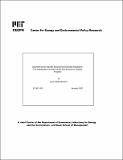Volunteering for market-based environmental regulation : the substitution provision of the SO₂ emissions trading program
Author(s)
Montero, Juan Pablo
Download97001.pdf (173.9Kb)
Other Contributors
Massachusetts Institute of Technology. Center for Energy and Environmental Policy Research.
Metadata
Show full item recordAbstract
In this paper we explore the practical and welfare implications of a system of voluntary compliance within a market-based environmental regulation. The Substitution Provision of the SO2 emissions trading program allows the owner or operator of an affected electric utility unit to voluntarily designate a non-affected electric unit to become subject to all compliance requirements of affected units and to receive SO2 tradeable emission permits (allowances). We find that although the Substitution provision has had a rather small effect on the overall performance of the SO2 emissions trading program and on SO2 emissions reductions, there has been a significant participation, with more than half of the "affected" electric utilities using this voluntary option to reduce compliance costs. This provides further evidence to the notion that, in general, electric utilities are choosing cost-effective strategies to comply with SO2 limits. Consistent with that is our finding that transaction costs associated to the Substitution provision has been relatively low. In another result, we show that non-affected units have opted in, largely because their actual unrestricted emissions (i.e. emissions in the absence of regulation) are below their historic emissions and hence their allowance allocation. Other units have opted in because they have low marginal control costs, say, below allowance prices. While the latter effect reduce today's aggregate cost of compliance by shifting reduction from high cost affected units to low cost units (the flexibility effect), the first effect increases today's emissions and emissions in the future (the adverse selection effect). An ex post cost-benefit analysis suggests that the adverse selection effect dominates, in part because of low allowance prices. From an ex ante perspective however, we show that this result may not hold.
Date issued
1997.Publisher
MIT Center for Energy and Environmental Policy Research
Other identifiers
97001
Series/Report no.
MIT-CEEPR (Series) ; 97-001WP.